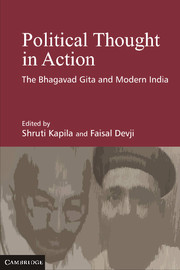Book contents
- Frontmatter
- Contents
- List of Contributors
- Acknowledgements
- Introduction
- 1 India, the Bhagavad Gita and the World
- 2 The Transnational Gita
- 3 The Transfiguration of Duty in Aurobindo's Essays on the Gita
- 4 Gandhi's Gita and Politics as Such
- 5 Gandhi on Democracy, Politics and the Ethics of Everyday Life
- 6 Morality in the Shadow of Politics
- 7 Ambedkar's Inheritances
- 8 Rethinking Knowledge with Action: V. D. Savarkar, the Bhagavad Gita and Histories of Warfare
- 9 A History of Violence
- Index
7 - Ambedkar's Inheritances
Published online by Cambridge University Press: 05 January 2014
- Frontmatter
- Contents
- List of Contributors
- Acknowledgements
- Introduction
- 1 India, the Bhagavad Gita and the World
- 2 The Transnational Gita
- 3 The Transfiguration of Duty in Aurobindo's Essays on the Gita
- 4 Gandhi's Gita and Politics as Such
- 5 Gandhi on Democracy, Politics and the Ethics of Everyday Life
- 6 Morality in the Shadow of Politics
- 7 Ambedkar's Inheritances
- 8 Rethinking Knowledge with Action: V. D. Savarkar, the Bhagavad Gita and Histories of Warfare
- 9 A History of Violence
- Index
Summary
Widely perceived as the most radical thinker and critic of caste in twentieth-century India, B. R. Ambedkar also remains the most enduring symbol of that country's emancipatory democracy. Relentlessly insurgent in thought and resolutely legislative in ambition, flirtatious with Marx but powerfully tied to the vicissitudes of his own revolutionary commitments, Ambedkar was not merely the foremost constitutionalist of free India but also the remorseless elaborator of the hollowness of the nation's freedom that had remained untouched by equality. Strikingly original in the way he conceptualized the varieties of power at the intersection of state and religion, Ambedkar was at once given to legislative reason and scriptural enchantments. He was born an untouchable within the Hindu fold, an identity he disclaimed on moral, political and religious grounds; and he died a Buddhist, to which he publicly converted in a spectacular dalit disavowal of free India's tolerance of untouchability. His prolific itinerary and his rigorously cosmopolitan cognition of suffering, one which allowed him to apprehend the negro, the Jew and the dalit within the narrative of universal dehumanization, secures Ambedkar rather decisively in the deformed constellation of twentieth-century humanistic thought. Such, clearly, are the legitimate broad strokes, if more than slightly homogenizing contours, of the didactic, secularist, and sometimes grudging nationalist appropriations of Ambedkar as the thinker of the Indian political.
- Type
- Chapter
- Information
- Political Thought in ActionThe Bhagavad Gita and Modern India, pp. 127 - 154Publisher: Cambridge University PressPrint publication year: 2013

